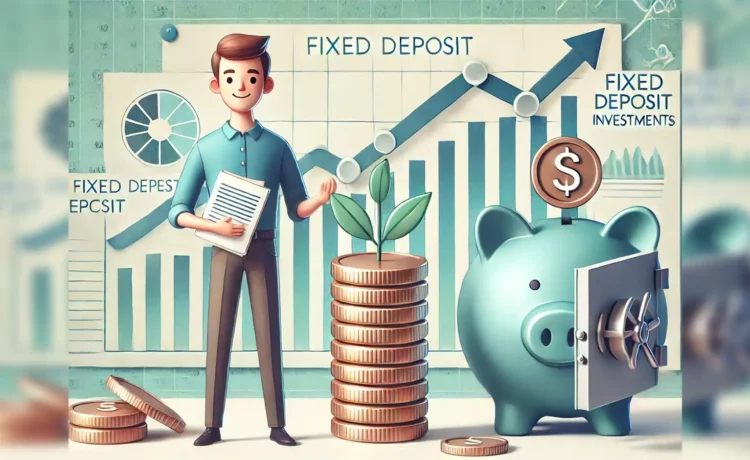FD are a popular investment choice because they offer guaranteed returns and minimal risk, making them ideal for new and seasoned investors. But what exactly are Fixed Deposits, and how do they work? In this guide, we’ll explain everything you need to know about FDs to help you understand how they can play a crucial role in achieving your financial goal.
Fixed Deposit
A fixed deposit is a secure investment plan that allows the individual to grow their lump sum amount over a fixed period. Once the agreement is done, it ensures a guaranteed interest rate unaffected by market fluctuations. The amount you invested would lock itself until maturity.

FD ( Fixed Deposit) Interest Rate
A Fixed Deposit interest rate is the percentage at which your investment will earn interest over a specified period. Predetermined when the FD account is opened, it remains fixed for the entire tenure. Interest rates can vary based on factors like:
- Tenure: The duration you choose to keep your money in the FD.
- Deposit Amount: The total sum of money you invest.
- Bank Policies: Rules and regulations the bank sets regarding their interest rates.
Types of Fixed Deposits
1. Short-term
Short-term Fixed Deposits have tenures ranging from 7 days to 1 year, making them suitable for short–term goals and emergency funds.
2. Long- term
These deposits have tenures ranging from 1 to 10 years. They offer higher interest rates for more extended periods.
3. Senior Citizen
It offers higher interest rates for seniors (typically 60+ years) and an additional benefit of tax exemptions, ensuring financial stability.
4. Non- Cumulative
These fixed deposits pay out the interest monthly or quarterly, which is suitable for individuals requiring regular income.
5. Cumulative
A cumulative fixed deposit is ideal for long-term savings, with periodic compounding boosting returns.
Factors that Affect FD Interest Rates
1. Market Conditions
Market conditions such as supply and demand for credit and liquidity impact FD interest rates.
2. Economic Indicators
Economic indicators like GDP growth, inflation rate and monetary policy affect FD interest rates.
3. Bank Policies
Each bank sets its interest rate based on lending and borrowing strategies, profit goals and competition.
4. Deposit Amount and Tenure
The FD interests also epend upon the deposit amount and tenure.
Benefits of Fixed Deposit
1. Guaranteed Returns
An FD account offers a fixed interest rate for the entire investment period, providing security.
2. Low Risk
Fixed Deposits are a low-risk investment option due to their predictable profits, principal protection, and minimal chances for capital loss.
3. Tax Benefits
FD Deposits offer the benefit of tax deduction under section 80 C of the Income Tax Act, which encourages long-term savings.
4. Flexible Tenure
The bank offers a range of tenure options for fixed deposits, so you can choose one that suits your financial goals.
5. Minimal Documentation
Opening an FD account is a simple application that requires minimal documentation.
6. Regular Income for Retirees
Interest on fixed deposits is paid monthly, quarterly, or yearly, making them a significant source of regular income for retirees.
Conclusion
With flexible tenure options, low risk, and guaranteed returns, FDs are an attractive choice for savers. Choose the right FD type, make informed decisions, and watch your savings grow to secure your financial future.













